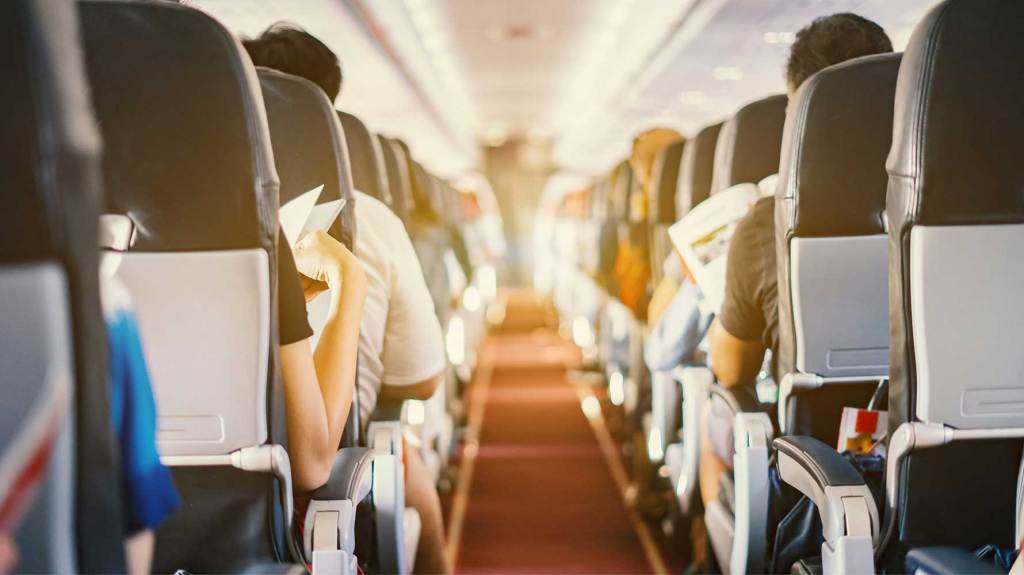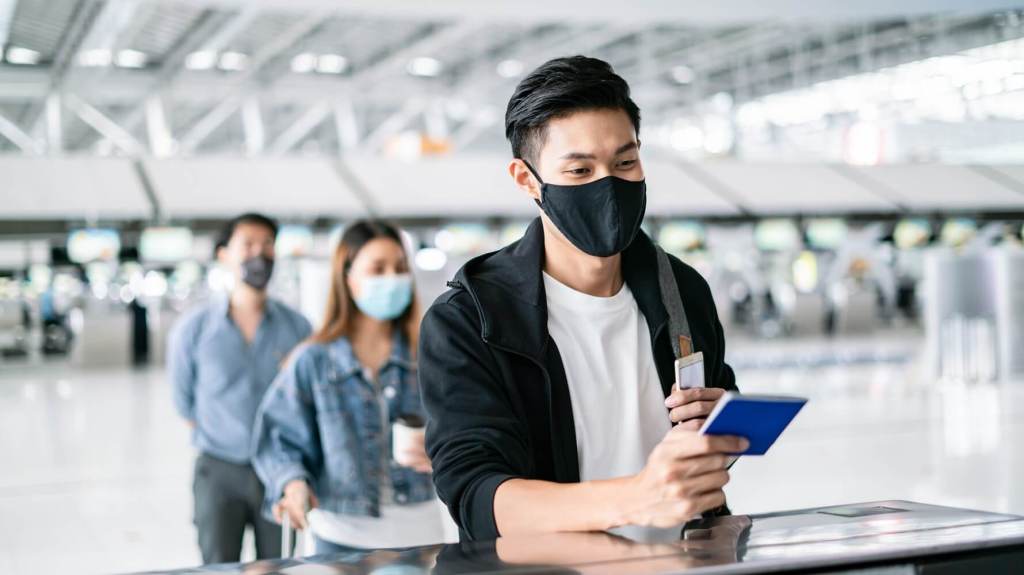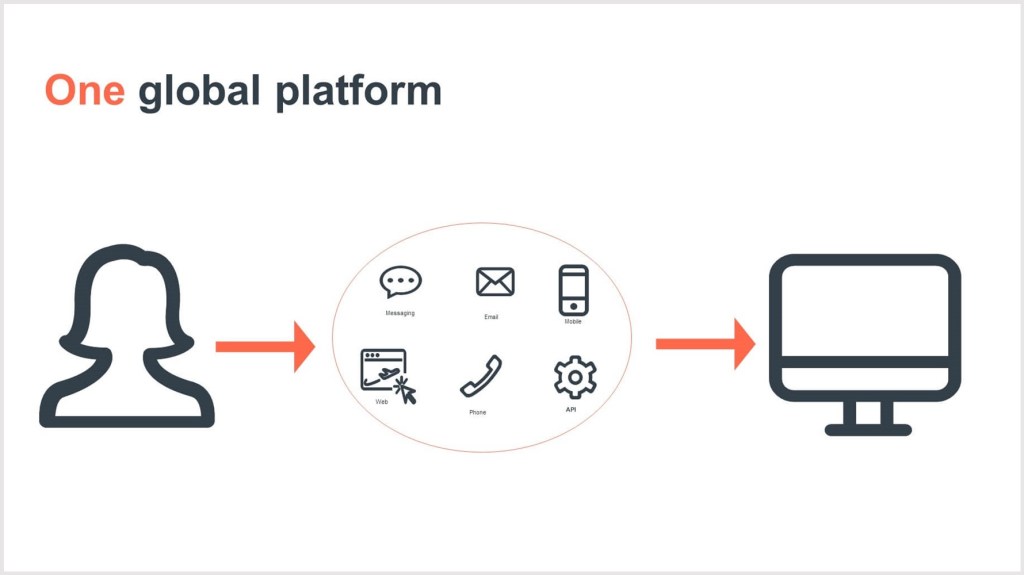Introducing the latest myCWT product and service enhancements
Building on our digital, omnichannel myCWT platform, our new products and services will simplify travel management for you and your employees – anytime, anywhere, anyhow.
Note: Featured services may not be available in your country at this time. Please reach out to your CWT representative for more details.
Hear from Chief Product Officer, Erica Antony as she shares the key product highlights of 2024, along with the key areas driving innovation.
-

2040: Baseline, Boom or Bust
As we enter an era of rapid transformation and unprecedented challenges, it is essential for travel managers, meeting & event planners, and corporate decision-makers to look ahead and frame our current strategic thinking with a clear vision of the future. Business travel and meetings and events (M&E) are poised for significant change over the next decade and a half, driven by a complex interplay of sustainability goals, technological advancements, evolving work models, and geopolitical dynamics.
In this paper to mark the 10th anniversary of our Global Business Travel Forecast, we explore, for the first time, a long-term vision of the future and potential trajectories through three distinct scenarios, each offering insights into how these forces should affect policy-making, budgeting and priorities. By examining these scenarios, we can better understand the diverse possibilities that lie ahead and the strategic imperatives required to thrive in each potential future.
Based on trajectory data analysis and interviews with industry leaders, behaviorists and climate tech founders, this forward-looking approach enables us to anticipate changes, strengthen our strategies, and make informed decisions that align long-term objectives. It is through this lens of foresight and adaptability that we can build resilience, seize opportunities, and navigate the complexities of the future.
We invite you to reflect on the insights presented, and consider how your organization can prepare for the opportunities and challenges that lie ahead. Together we can ensure that travel and meetings remain catalysts for growth, scalability and sustainable practices.
- Scenario development is both an art and a science
- Megatrends Shaping the Future of Business Travel, Meetings and Events
- Sustainability goals the new crux of corporate policy
- Technology Revolutionizes Travel Management
- Modern work models spark new travel patterns
- Changing demographics open doors to new opportunities
- Three Scenarios: Base case, boom and bust
- Future-proofing strategies

-

CWT GBTA Global business travel forecast 2025
When it comes to pricing, global business travel has finally reached an enduring, higher baseline. Prices will continue to rise in 2025, but only moderately, so expect a period of normalized growth.
However, this pricing environment, one of marginal gains and price regularity, is fragile. Global leisure travel has now realized a lot of its pent-up demand, while corporate travel has been resurgent, with 2024 edging at preCovid levels.
There are many factors at play, whether its volatile oil prices, labor costs and constraints, inflationary pressures, and geopolitical factors. As this elevated baseline edges upwards, albeit marginally, travel budgets will come under increased scrutiny, especially as travel patterns and attitudes change.
It’s why business travel can’t be viewed in a silo, and the true value to an organization must be fully realized. This forecast can help with those calculations.

-

Capitalize on emerging technologies in corporate travel
Technological advancements are accelerating at an unprecedented pace. How will emerging innovations like Generative AI, blockchain, and self-sovereign identity (SSI) transform corporate travel?
BTN and CWT probed global CEOs, travel managers, industry consultants and tech experts on the promises, questions, and expectations these innovations raise and how they are set to reshape traveler experience, cost control and service delivery in corporate travel and events.
Download and discover
- The technologies that will have the greatest impact on corporate travel in the next 2-5 years
- How these emerging technologies are poised to control costs, enhance service and security, and boost efficiency
- The critical challenges, opportunities, risks and roadblocks each innovation raises
- What travel managers, buyers and experts anticipate from these innovations

-

Out of office: Taking the stress out of booking annual leave
Bigger workloads, slimmed-down teams and new ways of working are common among business travelers, post-pandemic.
We polled our LinkedIn followers about their eagerness to travel. A whopping 58% were most eager, saying they had their ‘passport at the ready.’ That was for work. When it comes to traveling for leisure, ‘chomping at the bit’ would be an appropriate response.
Booking in annual leave can feel trickier than usual. First, there’s adding your dates to the team calendar and hoping your co-workers haven’t booked the popular times first – August and December being prime real estate. Then there’s sourcing cover and the inevitable mad rush to close urgent projects before you turn on your out-of-office. Here are a few ways to take the stress out of taking a break.
Brief your colleagues
To avoid unwanted text messages poolside, provide a detailed brief on each project/task and check if your colleagues have any questions regarding the tasks. As you delegate projects, provide a detailed brief on each task and check if your colleagues have any questions before you close your laptop.
Avoid scheduling too many meetings on your last day to leave time to craft a detailed handover without last-minute stress.
Hit the ground running
Before you leave, schedule in meetings for your return that play into your interests and will help you get a head start on projects, such as a creative brainstorm session or catch-up with a colleague who can give you the clearest picture of what you missed while away and what needs your attention. Avoid flying in late and starting work first thing the next day by factoring in a secret bonus day. Use it to unpack your suitcase, plan your first week back and ease back into work mode before reading your emails.
Checklists are your friend
You have enough on your plate with work tasks. Make a list of what to pack, check you’re not missing any documents by checking CWT Travel Essentials and download our handy travel checklist.
Image credits: Adobe Stock
-

A dose of reality: Vaccinations and returning to travel
accination programs are ramping up worldwide, and more people are starting to travel. A recent ‘temperature check’ among our Linkedin followers showed that around 60% are ready to take off. In the US, corporate travel demand is up to 30-35% of 2019 levels and expected to reach 66% by the end of 2022, according to a study by JPMorgan.
With the delta variant being a cause for concern and safety and security guidelines still changing on a regular basis, what do you need to take into consideration and how do you prepare yourself to travel?
The fully vaccinated will have it easier
It’s becoming increasingly apparent that for fully vaccinated people travel planning is much easier than it is for non-vaccinated people. Lots of countries are opening up their borders for the fully vaccinated. According to leaders such as the UK’s transport secretary full vaccination is expected to be a requirement to enter most countries from now on.
An important question to ask yourself is: when are you considered fully vaccinated? According to Dr. Hauptman – Medical Director Assistance, International SOS – in general, a person is considered fully vaccinated 2 weeks after the second shot of a two shot regimen, and two weeks after the one shot of a one shot regimen such as Johnson and Johnson. “There is research and growing evidence that for people who have had COVID-19, one vaccination shot instead of two (of a two jab regimen) may be sufficient for complete vaccination protection. Some countries, such as France, Spain, Italy, and Germany, have adopted policies providing people who have had COVID-19 just one dose of the two dose vaccines, and providing these people vaccination cards documenting full vaccination. However this is not universally accepted at this juncture as research is ongoing.”
When you are traveling and unvaccinated, take into account that in some regions/countries special regulations apply. France for instance has introduced a mandatory ‘Pass Sanitaire’ at the beginning of August that you need to show at places such as restaurants, theatres, shopping malls, and amusement parks to prove that you are double vaccinated or have tested negative. The city of New York recently began mandating proof of full vaccination from customers who want to eat indoors at a restaurant, work out in a gym or attend a show. Additionally, some New York City hotels are beginning to announce their own vaccine requirements.
Keep on checking local measures at your destination
As COVID-19 travel related guidelines change on a frequent basis, make sure you are prepared at all times. Even when you are fully vaccinated safety measures may still apply. Familiarize yourself with local and regional restrictions. There are tools to simply the travel experience like CWT Travel Essentials. This online tool includes a filter for fully vaccinated or unvaccinated travelers. You’ll find a simple list of required travel documentation that can be downloaded or completed online.
Follow safety guidelines at all times
Last but not least, follow basic COVID safety guidelines at your destination. These may differ from region to region. At some destinations face masks are not mandatory, for instance. To be on the safe side, make sure to maintain social distancing, and have your face masks and hand sanitizers ready at all times. The virus is still with us, so stay focused on your own personal safety and that of others.
Image credits: Adobe Stock
-

CWT appoints new Head of Global Market Management & Development, APAC
CWT, the Business-to-Business-for-Employees (B2B4E) travel management platform, has appointed Cheng Meng, Hwang as Head of Global Market Management & Development (GMD), to its dedicated APAC Leadership team. Based in Singapore and reporting into Belinda Hindmarsh, SVP, Head of Global Market Management & Development, Hwang will be responsible for ensuring customer expectations are met within the region, whilst steering the CWT APAC business forward and leading local expansion.
“As we continue to see a return to travel in many parts of the APAC region, I am thrilled to welcome Cheng Meng, Hwang to the team effective 10 August 2021. CWT’s GMD goal is to continually improve and accelerate our efforts in delivering world class client partnerships, support and service,” said Belinda Hindmarsh, SVP, Head of Global Market Management & Development. “I’m looking forward to Cheng Meng joining the APAC Leadership Team, as he brings with him a wealth of experience and skills from a broad set of industries, making him uniquely suited for this role.”
A 25-year veteran in the Global Distribution System and Travel IT industry, prior to joining CWT, Hwang held several global and regional leadership positions with Amadeus and Abacus (now Sabre) in areas ranging from Commercial Sales, Business Development, Strategic Corporate Planning, Customer Engagement, Operations and Partner Management to Consultancy Advisory Services. He has spent almost half his career overseas, managing business units in China, India and the United States of America.
CWT is a leading global partner in business travel, meetings, and events. Operating across six continents, we deliver sustainable, tailored solutions that help organizations connect, engage, and thrive in an evolving world. Our myCWT platform integrates advanced technology with human expertise to simplify travel and enhance traveler and attendee experiences. Extensive global coverage, seamless data integration, AI-driven analytics, and carbon-conscious travel tools enable businesses to optimize their travel and meetings programs while delivering measurable value.
With 150 years of industry experience and a deep commitment to partnership, CWT collaborates with clients to shape the future of business travel and events, making them more efficient, responsible, and impactful.
-

Green shoots: 3 sustainable travel trends
The ripples of impact from the pandemic will manifest in fundamental changes to how we travel, work and approach life for decades to come. A focus on sustainability was already in full swing pre-COVID but has moved to the top of the agenda for traveling employees and companies and organizations alike.
Here are three evolving areas – large and small – that are becoming increasingly important to eco-conscious business travelers.
1. Greener travel policies organizations
“Research suggests the pandemic has made consumers more eco-conscious,” said Niklas Andreen, CWT’s President and COO, “companies who want to meet the expectations of their customers and employees will need to step up their efforts to make their businesses and business travel policies greener.”
Organizations are keen to use this period of low volumes in business travel to make their travel programs more eco-friendly, and CWT is supporting them with this in a number of ways. Last year, we introduced our ECO responsible travel consulting framework. ECO is short for Employee Wellbeing, Climate Impact and Organizational Performance, and the framework is designed to help companies fulfill these different priorities. The end-to-end consulting program covers five areas – strategic assessment, travel policy reviews, supplier sourcing & management, change management, and reporting & insights – to create more balanced travel programs.
2. The final mile
“There’s discussion in the market about how travelers fill in the so-called ‘final mile’,” said Rob Coomer, CWT’s Snr. Director Customer Management, “specifically how they’re travelling the distance from the terminal or station to a meeting location.
There has been an increase in micro mobility options to accommodate these final mile journeys, such as city bike rentals and e-scooters, as we’ve seen in Paris and London, and which is now expanding. Broadening options and campaigns from governments that encourage walking and cycling throughout the pandemic will lead to a shift in how ‘the final mile’ is taken in the future.”
3. Sustainable aviation fuel
Sustainable aviation fuel (SAF) is derived from sustainable feedstocks and is similar in its chemistry to more commonly used fossil jet fuel. Using SAF results in a reduction in carbon emissions compared to the traditional jet fuel it replaces over the lifecycle of the fuel.
Sustainable aviation fuel is an exciting development in the CO2 reduction arena because it allows organizations to focus less on offsetting and more on overall de-carbonization.
As we see a renewed focus on the environment from within our industry post-pandemic, we are observing a desire to help make SAF achieve the economies of scale necessary to become commonly viable. Several airlines are leading the way on initiatives on sustainable aviation fuel.
For example, we recently announced a partnership with Delta Air Lines on an agreement to purchase enough sustainable aviation fuel (SAF) to cover the projected fuel usage from all of CWT’s travelers on Delta on 5 June, which was World Environment Day.
Find out more about how to measure success in sustainable travel over at CWT’s podcast, Business Travel On the Fly.
Image credits: Adobe Stock
-

Navigating budgets and compliance with CWT easy meetings

Objective
A cargo and shipping company with offices in 26 countries often had employees on the road or meeting out of the office. But up until now, most of these meetings were booked without a standardized process – meaning it was up to the meeting owner to try and find a convenient meeting room or venue based on what they could find in their location. As a result, employees were losing time finding suitable venues off-channel, and the company lacked data and visibility on most meeting spend. They also didn’t know who was meeting offsite and when, significantly reducing their ability to check on employees in emergency situations.
The company decided to implement a streamlined solution to help solve this issue and looked to CWT Meetings & Events to support them in this process.
Challenge
In order to increase adoption to their meetings & events program and enable all employees to book the right venues in-channel, the company required one streamlined solution that would be available in all its operating countries, providing a consistent and streamlined end-to-end experience to all its users.

With a lack of data and the need for more control over non-managed spending, the client wanted a cost-conscious, scalable, and controlled approach to ensure compliance in all transactions. They also wanted to include the option to request support from professional meeting planners if an employee needed more than just a meeting room.
As a pilot, they asked our team to first implement the solution in the Nordics before scaling it globally.
Solution
CWT’s technology and operations teams built a unique digital interface for the client, where users had two main options:
- “Book a meeting room” – which links directly to CWT easy meetings, our meeting room booking tool with direct access to over 250,000 meeting rooms in more than 90 countries.
- Or “Request support for your meeting/event,” – which would connect them directly to their local CWT teams to start planning their next event.
The interface was directly integrated into the client’s intranet and connected through SSO (single sign-on) – meaning the users would move without friction from one tool to the next without the need to log in again.

Our teams also set up account tracking tools within the system to see and measure the activity by user group or single user and allow supervisors to view and approve each booking before confirmation. The tool covered the client’s different countries in their local language and was ready to scale globally for all their markets.
Results
The client’s teams praised the platform for its excellent user experience. Employees spent considerably less time on booking venues and meeting rooms.
The client also realized that their small meetings activity was much bigger than expected. They gained total visibility on spend and more control over their budgets. For instance, much of their spending going to preferred suppliers was not consolidated and had impacted their hotel program. The client now achieved a near 100% compliance in all bookings.
Following the successful launch of the tool in its key market, the client decided to expand to more markets and more regions around the world.

Quick facts
- 100 % compliance and budget control
- Increased visibility of spend across markets
- Positive feedback from users across the company
-

Cool runnings: 3 ways to ease travel anxiety
Business travel is picking up amid loosening restrictions, but not everyone is ready to hit the road. Bar attempting to bring an emotional support peacock onboard a plane, as one woman did back in the halcyon days of 2018, many of us would welcome tools and strategies to help ease back in to the swing of the suitcase life.
In March we polled our customers who said the most important enablers to see them return to business travel were widespread vaccine distribution (Weighted 4.5 out of 5). Global vaccine inequality is a source of major concern however many countries are seeing high rates of vaccinations, leading to increasing confidence among travelers. 4.25 billion doses have been administered globally, according to Our World in Data.
While the future looks hopeful, therapists say that many people are experiencing travel anxiety as a result of the trauma of the pandemic, and an abrupt change in lifestyle. Here are three ways to help ease the pressure.
1. Make it RAIN
Practice awareness and self-compassion
Psychologist Tara Brach recommends an easy-to-remember tool for practicing compassion and increasing awareness. The acronym RAIN stands for
Recognize what is happening;
Allow the experience to be there, just as it is;
Investigate with interest and care;
Nurture with self-compassion.
Figuring out the exact reasons behind your travel anxiety can be the first step in feeling more confident about taking a trip. She offers a free printable guide. Meditation, mindfulness and awareness practices help decrease levels of cortisol.
2. Tick the boxes
List and manage what’s within your control
Travel anxiety is often triggered by fear of the unknown. There are more variables now than ever before and that can overwhelm some people. Download your CWT Traveler Checklist, and check CWT Travel Essentials for up-to-the-minute guidelines and restrictions.
3. Chat to the early birds
Ask others about their experience
You can try exposing yourself to some elements of travel that you’re concerned about (like being around crowds) at home. It can also help to chat to people within your organisation who have already travelled for business.
Image credits: Adobe Stock
-

World day against trafficking in persons and how you can change someone’s life on a flight
‘The true measure of any society can be found in how it treats its most vulnerable members,’ reads the famous Gandhi quote. Human trafficking – the illegal movement of a person into or through a country by force, threat or deception to exploit them – can affect anyone of any age, gender or nationality.
Survivors of human trafficking go on to live fulfilled, safe lives, often with the support of individuals, communities and groups like ECPAT, a worldwide network of organizations working to support survivors and law enforcement, influence governments and provide training; of which CWT is a member.
Now is the best time to act
The pandemic has pushed as many as 124 million more people into extreme poverty, leaving millions vulnerable to sexual exploitation, forced labour and other forms of abuse.
This year’s theme for World Day Against Trafficking in Persons highlights the importance of listening to and learning from survivors of human trafficking. Survivors play a crucial role in establishing measures to prevent, identify and rehabilitate.
Many trafficked people have experienced ignorance or misunderstanding in their attempts to get help, and have faced revictimization and punishment for crimes they were forced to commit by their traffickers.
One person at the forefront of a survivor-centred approach to combating human trafficking is Yvonne Chen, Director of Private Sector Engagement at ECPAT USA. In the latest episode of CWT’s Business Travel On the Fly podcast, we learn:
- Why survivors and those with lived experience hold the key to crafting legislation and policy.
- Essential advice for business travelers & companies.
- From working on refugee rights in Cape Town and California to running safehouses in New York – How meeting survivors has inspired a global mission.
With millions more vulnerable around the world, each and every business traveler and employer can help prevent cases, empower survivors and identify those vulnerable to trafficking at airports, on planes and in our communities. Let it be the measure of us.
Listen to the podcast: How to change someone’s life on a flight
Image credits: Adobe Stock
-

3 ways that NDC will play a key role in the recovery of business travel
“These are 3 ways that NDC will play a key role in the recovery of business travel”, says CWT’s Erik Magnuson in conversation with Amadeus’ Paul de Villiers.
In a video launched today, Paul de Villiers, Senior Vice President, Global Accounts, Business Travel speaks to Erik Magnuson, CWT’s Vice President of Product Management, Mobility & Payments.
CWT recently announced the exciting milestone that it made the first-ever New Distribution Capability (NDC) booking via Amadeus’ flagship corporate booking tool, an important milestone in the acceleration of travel retailing.
New Distribution Capability (NDC) is an initiative for the adoption of a new common data transmission standard within the airline industry, enabling it to transform the way air products are retailed to both leisure and business travelers. Here are three ways that NDC will play a critical role in boosting confidence and bolstering a return to travel
1. Improved productivity
“When on a trip, employees need to be productive, engaged and looked after. NDC facilitates this by allowing the conversation to move away from a strictly cost-based to value-based discussion, focused on the entire trip,” says Erik Magnuson, “For example – I find when I am on a flight it’s a great time to clean up my email inbox. This is almost impossible to do in some seats given my height. Personally, I would appreciate if CWT negotiated a new bundled offer for me, that included extra leg room and wifi. This would address my comfort, improve my experience and make me a more productive employee for CWT.”
2. Consistent traveler experience
NDC is one part of a much wider journey to enhanced modern retailing. With several more factors to consider compared to pre-pandemic days and changes in attitude to business travel, travelers now expect the same level of offers and services they get from companies outside of the industry such as Netflix or Spotify. Amadeus’ travel ecosystem, end-to-end integrated technology, expertise and collaborative approach help to deliver this vision.
For airline distribution this is about delivering unique content, maintaining servicing capabilities and improving experiences during the booking journey, regardless of the channel that clients choose.
3. Corporate travel – simplified
There is no doubt that as we return to travel, we will experience many changes in a post-pandemic world – changed travel policies, new vaccination requirements and enhanced health measures. These will all add to the complexity and stress for travelers as they take to the sky again. What is exciting to see amongst all this, is the possibility for NDC to help simplify the travel experience, creating a more personalized, convenient and modern retail experience for both travelers and counselors.
For the corporate travel industry to recover, we need strong collaboration throughout the ecosystem.Image credits: Adobe Stock
-

Ahead of the curve: Preparing for customer authentication (SCA) in business travel
Strong customer authentication (SCA) is likely something that you are already familiar with. Think about logging onto a website or having to reset a password where you receive a one-time password on your mobile device; That’s SCA. It is becoming more broadly used in e-commerce and is now being legally mandated for some payment types.
According to Allied Market Research – and, possibly spurned by the pandemic – there has been a surge in demand for alternatives to cash payments. The global credit card payments market generated over $135 billion in 2020, and is estimated to garner $263 billion by 2028.
It will be a source of comfort for many that strong customer authentication (SCA) is now a requirement set by regulators for e-commerce transactions in the European Economic Area and the UK, and not just for the travel and hospitality industry. While the current focus is on European countries, CWT is preparing for the likelihood that these SCA protocols will be used for future transactions, beginning with EMEA.
How does SCA work?
SCA requirements stipulate that electronic payments be completed with a multi-factor authentication to improve the security of electronic payments. To date this has not generally been true for Internet transactions prior to the implementation of the requirement.
SCA means that for each electronic payment, subject to some exemptions, the cardholder must be authenticated (i.e. verified) by at least 2 of the following 3 factors:
- Something the cardholder knows (e.g. a password, PIN code, secret fact)
- Something that is inherent to the cardholder (e.g. a fingerprint, facial or iris scan)
- Something the cardholder has (e.g. a mobile phone, smart card, badge or token)
Booking travel introduces complexities to SCA. Purchasing travel products involves a complex end-to-end orchestration that includes multiple vendors and multiple booking options. Travel agencies or TMCs like CWT are simply the ‘agency’ representing travel vendors including airline, car, hotel companies. TMCs are reliant on the entire travel eco-system to connect and align with SCA requirements to avoid any roadblocks.
Given the complexities in the travel indirect sales model, fully permanent payment solutions will take some time to realistically implement across all partners: TMCs, OBTs, GDSs, aggregators, card schemes, merchant acquirers, card issuers, payment gateways, and other payment providers. CWT continues to work with these partners and industry trade groups to align solutions and ensure a positive customer experience while meeting the imposed regulatory requirements.
We take credit card security seriously from multiple payment options to meeting PCI security requirements. CWT has a dedicated payments team that focuses on all aspects of regulatory compliance and future payment solutions including constantly watching for changes as they occur in this area.
What steps to take
As a travel manager, CWT recommends that you begin by contacting your corporate bank to best understand what, if any action is required. Engagement with your bank will clarify whether your selected payment products are subject to SCA and what other payment products may be available to avoid SCA. You may also consider including your finance team who may act as a support or SME during the discussions.
Watch out for the next blog in our series on secondary card payment, where we will take a closer look at what is in scope and out of scope specific to the type of vendors and cards that you have.
Image credits: Adobe Stock
-

Return to travel roundup: A step-by-step roundtrip checklist
As travel begins to pick up, the opportunities for face-to-face interaction will lead to innovation and growth, and a welcome return to the connections we previously took for granted. But these days business travel is a moveable feast when a course-by-course menu would be easier to digest.
No matter the scenario, we created a checklist for travelers to help them prepare for their next trip.
Before you travel
- Understand COVID-19 guidelines and restrictions: Countries have established entry/exit requirements depending on your departure location. This may include testing requirements, quarantines and more. Check the requirements using our CWT Travel Essentials tool.
- Collect required documents: Bring required documents such as passport, international travel certificate, health certificate (if required). Information can be found on the CIBT website or you can view requirements on the myCWT app.
- Download travel app (myCWT) and/or make sure to bring important travel contact info.
Have information easily accessible in case you need to make adjustments to your trip enroute. Download the myCWT app - Research re-opening activities at your destination
Before exploring beyond your hotel room and meeting space, check city-specific sites for your destination. For example, search “traveling to (city name) now,” and you should get a COVID-19 specific site. (Here is New York City as an example.) - Check health insurance coverage
Check with your insurance to be sure you are covered outside of your home country if medical assistance is required. - Review company travel policy
Understand any COVID-19 related updates to your policy and find out how to manage extended travel should the need arise. - Update your travel profile for missing or expired information
As COVID-19 measures including contact tracing continue to impact the information needs of airline carriers around the world, a current mobile number and email address is required in each booking. To further enhance your travel experience, ensure all information such as your credit card, passport and other travel documentation is current.
En Route
- Check your airline website the evening prior and 5 hours prior. The OAG website gives you the last airline schedule changes.
- If traveling by train or ferry, check information before departure Check COVID-19 related requirements and schedules.
- Check origin and destination airport information
- Have a look at the airports’ websites, which will offer valuable information for travelers.
- Wipe down surfaces–seats at airport, arm-rest/tray table on aircraft, etc.
- Most airlines require face masks but may not provide them. Bring your own masks!
- Bring your own beverages (and snacks).
- Plan ahead with pre-packed snacks, and purchase beverage at airport prior to boarding. You may not have beverage service on your flight.
- Upon landing at destination, remain seated and await crew instructions. Deplaning rules vary by airline and destination
Upon Arrival
- If being picked up by friends, relatives or associates, arrange a pick-up point outside of the airport building. Non-travelers may not be allowed to enter arrival terminals.
- Check the car rental agencies’ COVID-19 policies.
- Wipe down surfaces Disinfect steering wheel, vehicle controls, dashboard, seatbelt release, etc. □ Drive with windows open Allow fresh air to circulate throughout the space.
- Understand and abide by local COVID-19 protocols.
- In some locations, you might be subject to quarantine or isolation. Research and familiarize yourself with local and regional restrictions. Check the requirements.
- Research what’s open, what’s not, and what options are available. Some businesses may have limited hours during the pandemic. Research food options to find out if you can dine in, if outdoor dining is available, and/or if establishments offer contactless delivery.
- Make your way to rental car counter or ride-sharing and taxi pick up locations as quickly as possible to avoid long lines
Heading home
- Understand your home area’s requirements following domestic and/or international travel using CWT Travel Essentials.
- Wash and sanitize clothing, bags, and work equipment.
Download your complete Return to Travel Checklist.
Image credits: Adobe Stock
-

CWT enriches customer experience through new omni-channel
CWT, the Business-to-Business-for-Employees (B2B4E) travel management platform, today announces the launch of its global omni-channel customer experience (CX) platform. Enabling efficient information sharing across all customer channels and work streams, CWT travel counselor’s responsiveness is boosted via a 360° real-time customer view, including where they are in their trip, their travel policy and trip history, as well as their channel contacts – via a consumer-grade service screen.
“With customers’ expectations at an all-time high as a result of the pandemic, the need for more personalized content as well as streamlined and concise interactions each and every time customers engaged with us, regardless of channel, became apparent,” said Niklas Andreen, CWT President & Chief Operating Officer.
“Having made significant investments in customer channels and data to date, we needed a solution that could operationalize these insights, simplify our existing CX applications & tools, and provide our customers with the most personal and relevant actions at each stage of their journey. Our new CX platform does just that, with one view of the traveler’s journey across all channels, allowing for more dynamic customer conversations.” John Pelant, CWT EVP Chief Technology Officer concluded.
By combining internal data (historical customer bookings, travel policies, channel preferences, personal traveler preferences, contact history etc.) with data from real-time interactions (online search history, in progress or upcoming bookings, real time travel information etc.), CWT’s new CX platform will prioritize the streamlining of email, telephony and messaging channels this year, with all other channels scheduled for platform integration throughout next year. Key improvements expected include:
- Email: using Natural Language Processing (NLP) fielding 16 languages and Artificial Intelligence (AI), inbound email management will become more efficient – whereby the intent and language of each inbound email will be detected. This enables each request to be prioritized, specific to deadline or urgency and fielded to the best counselor in terms of native language and expertise, to process
- Telephony (available across EMEA, APAC and NORAM):with accurate amalgamated customer contact, travel, preference and policy viewable on one consumer-grade service screen, counselors are able to provide truly informed and personalized customer conversations, on every single call
- Messaging (available across 100+ countries where CWT messaging is live): using NLP and AI, customer queries will be categorized, prioritized and effectively addressed by a seamless blend of chatbot & counselor interaction
CWT has partnered with Pegasystems Inc. (an industry leader in digital transformation software) to customize and configure a cloud-based platform that meets our specific and unique needs.
CWT is a leading global partner in business travel, meetings, and events. Operating across six continents, we deliver sustainable, tailored solutions that help organizations connect, engage, and thrive in an evolving world. Our myCWT platform integrates advanced technology with human expertise to simplify travel and enhance traveler and attendee experiences. Extensive global coverage, seamless data integration, AI-driven analytics, and carbon-conscious travel tools enable businesses to optimize their travel and meetings programs while delivering measurable value.
With 150 years of industry experience and a deep commitment to partnership, CWT collaborates with clients to shape the future of business travel and events, making them more efficient, responsible, and impactful.
-

Podcast: How to change someone’s life on a flight
Human trafficking – the illegal movement of a person into or through a country by force, threat or deception to exploit them – can affect anyone of any age, gender or nationality.
In trafficking in persons, criminals are adjusting their business models to a new reality created by the pandemic, especially through the abuse of communications platforms. At the same time, COVID-19 impacts the ability to provide essential services to trafficked persons.
Since 1999 CWT and the Carlson Family Foundation have taken a holistic approach to fight trafficking through our core business activities, philanthropy, advocacy, and strategic partnerships.
CWT’s Julian Walker, Head of External Market Communications & PR speaks to Yvonne Chen, Director, Private Sector Engagement, ECPAT USA about how we can individually and collectively turn the tide on trafficking.- Why survivors and those with lived experience hold the key to crafting legislation and policy.
- Essential advice for business travelers & companies.
- From working on refugee rights in Cape Town and California to running safehouses in New York – How meeting survivors has inspired a global mission.
[buzzsprout episode=’8946955′ player=’true’]